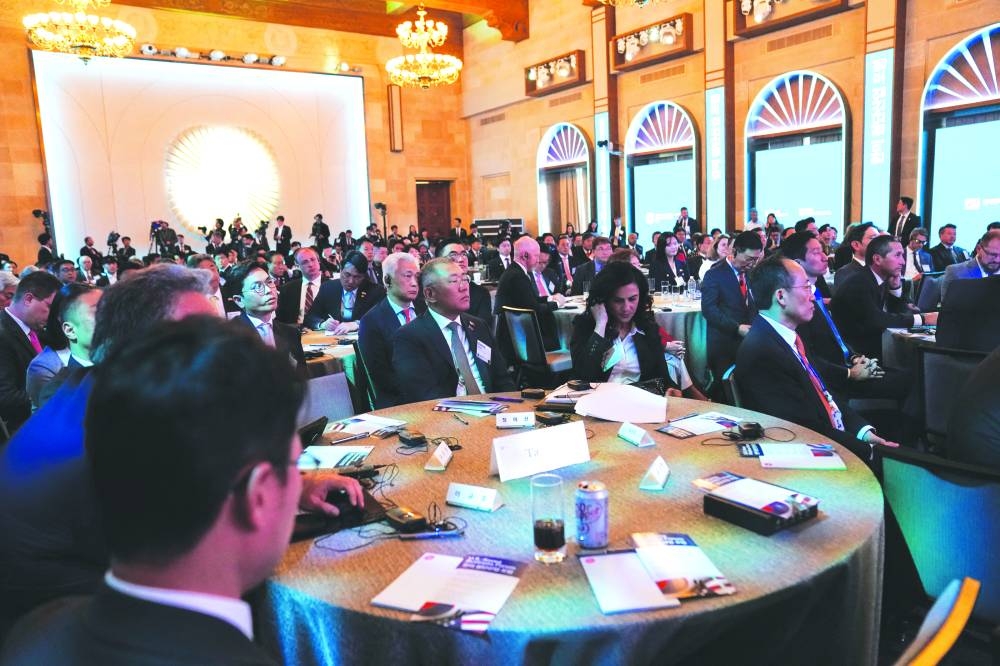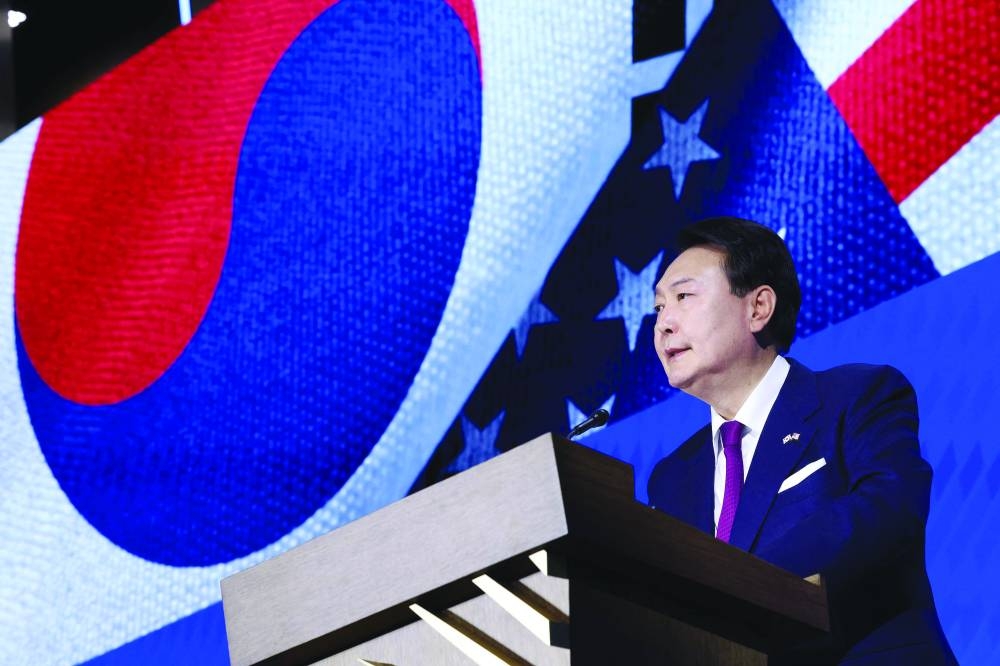South Korean President Yoon Suk-yeol said the South Korean-US alliance must “leap into a new phase” to jointly overcome complex crises, including slowing economic growth, technology competition with strategic rivals and climate change.
Speaking a day before a Washington summit with President Joe Biden, Yoon told an event hosted by the US Chamber of Commerce the bilateral security alliance should “evolve into a supply chain and future-oriented, innovative-technology alliance.”
He said the two countries’ economies had been facing new challenges and the economic slowdown was unsettling the investment environment. “Competition for technological hegemony, energy issues and climate crises are casting more uncertainties on business activity day by day,” Yoon said.
Yoon said that from a joint venture involving a South Korean and a US firm in 1965, South Korea had risen to become the global leader in memory semiconductor production, accounting for 60% of global market share.
“This co-operation should extend beyond semiconductors to future emerging technologies such as AI, Quantum, SMR (Small Modular Reactors) and more,” Yoon said.
Core technologies from the United States and South Korea’s advanced manufacturing capabilities would “create enormous synergies that will benefit both countries,” he said.
Yoon said he hoped that during his visit the countries would reaffirm their status as true allies and advanced technology partners to create innovative business opportunities. “Our bilateral investments need to be expanded both quantitatively and qualitatively, to build more stable and resilient supply chains.”
He said the two nations were the ideal partners for “friend-shoring” - a reference to a US-led process of reducing dependence on China for key goods and materials although he made no mention of China by name. Yoon said his government was working to create a fair and predictable market environment and to offer significant tax credit to facilitate bold investments by US companies.
“The Republic of Korea and the United States have been painting a wonderful rough sketch together for the past 70 years,” he said. “The next 70 years together will be a journey of filling the rough sketch with well-matched colours.”
US President Joe Biden and South Korea’s President Yoon Suk-yeol will pay homage at the Korean War Memorial in Washington ahead of a state visit cementing the countries’ deep alliance. Biden, Yoon and their wives were set to gather at the haunting monument, depicting life-sized steel statues of US soldiers marching during the 1950-53 war against the communist north.
On Wednesday, Yoon and his wife Kim Keon-hee will arrive at the White House for only the second full-fledged state visit of the Biden era, following France’s Emmanuel Macron.
This will feature lavish ceremonial events and a gala White House dinner.
But beyond the pomp and circumstance, Biden and Yoon will discuss their countries’ deepening partnership in an increasingly volatile Asia-Pacific, where North Korea is ramping up nuclear-capable missile production and China is sabre-rattling around Taiwan.
White House National Security Advisor Jake Sullivan told reporters that Biden and Yoon have had four “engagements” since Yoon took office less than a year ago and “have developed a rapport.”
The alliance “has grown far beyond the Korean peninsula and is now a force for good in the Indo-Pacific and around the world,” Sullivan said, noting that Yoon had been the first South Korean leader to attend a Nato summit. Yesterday, Yoon was set to visit Nasa’s Goddard Space Flight Center just outside Washington, along with US Vice-President Kamala Harris.
Washington and Seoul are also highlighting the strong cultural links, something emphasized by Netflix’s announcement of a $2.5bn investment in South Korean content. Netflix CEO Ted Sarandos met with Yoon in Washington on Monday.
A big task for Biden will be reassuring his guest over the US commitment to “extended deterrence” - the US military umbrella for South Korea. “President Biden will reinforce and enhance our extended deterrence commitments to South Korea with respect to the threat” from North Korea, Sullivan said.
Sullivan said to expect “major deliverables on extended deterrence, on cyber co-operation and climate mitigation, foreign assistance, on investment, and on strengthening our people to people ties.” But the two leaders have some “uncomfortable” topics to discuss, said Katharine Moon, Professor Emerita of Political Science at Wellesley College.
The South Korean president has seen his domestic approval ratings dive over his handling of a recent US intelligence leak that appeared to reveal Washington was spying on Seoul.
In Washington, Yoon is meanwhile likely to come under pressure to do more to help the US support Ukraine, as Washington looks to South Korea - the world’s ninth-largest arms exporter - to help secure ammunition and weapons for Kyiv.
South Korea has sent humanitarian assistance to Ukraine, and has sold tanks and howitzers to Poland, but Seoul has a longstanding policy of not providing weapons to active conflict zones. Seoul is also mired in a diplomatic spat with China after Yoon blamed recent heightened tensions over Taiwan on “attempts to change the status quo by force” in an interview.

Attendees listen as South Korean President Yoon Suk Yeol delivers remarks to the U.S.-Korea Business Council at the U.S. Chamber of Commerce in Washington, DC yesterday.

South Korean President Yoon Suk Yeol delivers remarks during a US-Korea Business Forum at the US Chamber of Commerce yesterday in Washington, DC. President Yoon Suk Yeol, on his first trip to the United States as president, will meet with U.S. President Joe Biden and will deliver an address to Congress.
